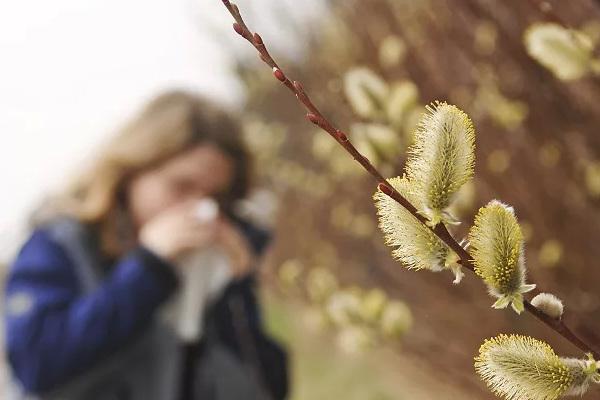Зміст
Allergy to birch and poplar
Are you allergic to birch or poplar? In this case, April will be the most difficult month of the year for you. It is in April that birch and poplar bear the notorious title of the queens of allergens. Regardless of which region of Ukraine we take into account, the concentration of birch and poplar pollen in the air reaches an average or high level in April. The pollen of these two plants is very common in allergic rhinitis and allergic conjunctivitis.
What else is gathering dust in April? At the end of this month, the oak begins to pollinate, and spores of the fungus, mysteriously named Cladosporium and Alternaria, begin to appear in the air. These spores, along with pollen, are the most serious cause of spring inhalation allergies.
Symptoms of mold allergy are usually worse in the spring and fall. The spores of these fungi are found, among other things, in tree trunks and dead leaves. They can also appear in houses and apartments, especially with poor ventilation. They grow more easily in rooms where clothes are dried or many flowers are grown in pots.
Unsurprisingly, allergy sufferers experience symptoms such as:
- sneezing
- Watery, tiring runny nose,
- Stuffy nose
- sleep problems,
- Difficulty concentrating,
- Watery eyes
- Redness of the conjunctiva,
- burning and itching of the conjunctiva.
Pollen allergy – how to deal with it? Allergist visit and medication

Are there ways to relieve pollen allergy symptoms? First, go to an appointment with an allergist who will treat you.
“It is worth remembering that good seasonal allergy control will not only improve the quality of life during pollen season but also reduce the likelihood of developing other allergic diseases and complications of chronic inflammation of the mucous membranes.
In pharmacies, you will find drugs for allergies, both oral, in the form of tablets and syrups, as well as nasal sprays and eye drops. In some cases, inhalation of steroids may be needed to relieve shortness of breath when exposed to an allergen.
Thanks to properly selected drugs, it is possible to significantly alleviate and even stop persistent symptoms of spring allergy.
Home remedies for pollen allergies!
But are medications the only solution for pollen allergies? Well no! There are also home remedies that can help with treatment. They can help prevent bouts of pollen allergy.
Home remedies for spring allergies:
- Keep track of plant pollination – a calendar will help you plan the coming months. Leave more activity outside the house during periods when the concentration of allergenic pollen is low,
- avoid walking in forests or parks on dry days and during the day when the concentration of pollen is highest,
- It is advisable to walk immediately after rain when the air is free of most allergens,
- stay at home during the day to minimize your exposure to pollen,
- take care of the air quality in your home – buy an appropriate filter that removes pollen and pollutants from the air,
- do not smoke and avoid cigarette smoke – it harms the respiratory system and further aggravates the symptoms of inhalation allergy – if you are a smoker, learn how to quit smoking. The most important thing!
- Make sure your home has the correct humidity – see the article: How to humidify the air in your home? So allergy against dry air,
- Regularly clean the house, avoid carpets and curtains on which dust and pollen settle,
- equip the vacuum cleaner with a suitable filter that traps the appearance of allergens, including pollen,
- change the litter frequently,
- wash bed linen and towels at high temperatures.
If you follow these simple rules, you can significantly minimize the unpleasant symptoms of spring allergies. With the right handling and the right habits, you will be able to fully enjoy the delights of the coming spring without any restrictions!
Inhaled allergens: the pollen calendar – what causes us allergies and when?

Allergens by inhalation are a whole group of sensitizing substances that spread in the air and get to the allergy sufferer along with the inhaled air. This group includes factors that we are exposed to at home (dust, animal hair) and outdoors (pollen from trees, plants, and fungi). In addition, inhaled allergens can also be categorized as year-round and seasonal. It often happens that you are allergic to more than one particular allergen.
Usually, rather inconspicuous, but ordinary plants, the pollen of which is easily carried by the wind, cause allergies. Allergies to plants whose pollen is sticky and heavy (such as a rose) are much less common because they are less tolerated by the wind and therefore less concentrated in the air. Insects mainly distribute this «heavier pollen
On the other hand, the lighter pollen produced by allergenic trees and grasses is carried by the wind and easily enters the eyes, nose, and respiratory tract with the inhaled air.
The time of obtaining the pollen of a given plant depends not only on its species but also on the geographical latitude and weather conditions.
Spring allergies – what you need to remember to survive it?
Most spring allergies are caused by inhaled allergens. A pollen calendar can help you determine when the plants you are allergic to are most active. Find out what can cause you an allergic reaction when contacting an allergist – a specialist can order allergy tests.








